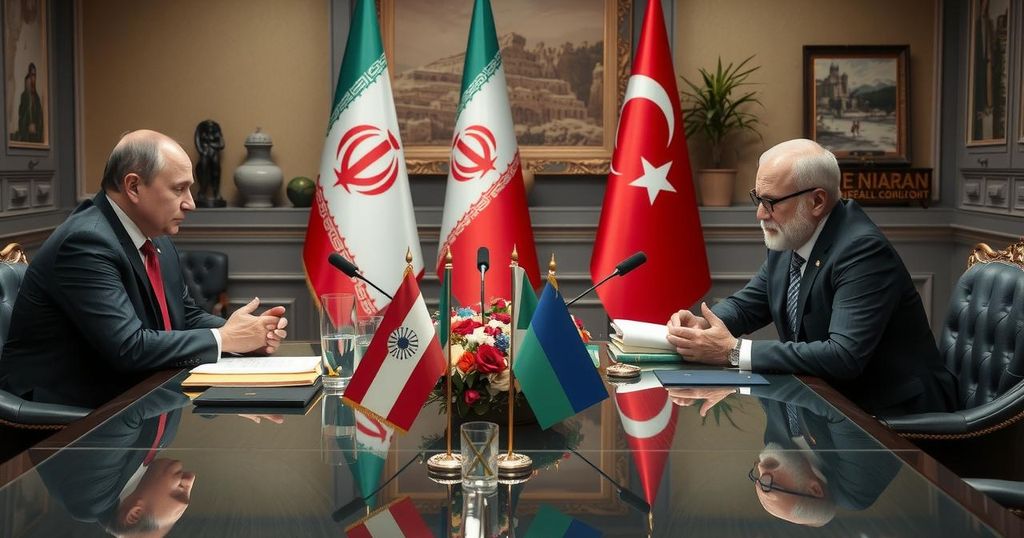World news
AGENCE FRANCE - PRESSE, ASIA, BASHA, BASHAR AL - ASSAD, CONFLICT, ERDOGAN, EUROPE, EUROPE/ASIA, FIGHTER JETS, HA, HAKAN FIDAN, HAMA, IRAN, MILITARY, REC, REUTERS, RUSSIA, SYRIA, SYRIAN CIVIL WAR, SYRIAN CONFLICT, SYRIAN NATIONAL ARMY, U. S. - BACKED SYRIAN DEMOCRATIC FORCES, UKRAINE, WAR
Ethan Kumar
0 Comments
Turkey, Russia, and Iran Convene to Address Syrian Rebel Advances
Turkey, Russia, and Iran will meet in Qatar to discuss the recent advances by Islamist rebels in Syria, threatening stability in the region. The talks will focus on the implications of these developments for the Astana process and broader geopolitical dynamics, particularly regarding Kurdish forces and the U.S. military’s role in combating ISIS.
This weekend, senior officials from Turkey, Russia, and Iran will convene in Qatar to address the recent surprising advancements made by Islamist rebels in Syria, which have significantly shifted the dynamics of the prolonged civil conflict. The discussions, occurring on the margins of the Doha Forum, will be led by Turkey’s Foreign Minister Hakan Fidan, along with his Russian and Iranian counterparts, in line with the Astana process aimed at reaching a political resolution to the war.
The Astana process, initiated in 2017, involves Turkey, Iran, and Russia, with each nation playing distinct roles in supporting various factions. Turkey has long backed opposition forces, while Russia and Iran have provided considerable support to the Assad regime. Previous efforts, including a ceasefire negotiated in 2020, allowed President Bashar al-Assad to regain control over most major territories. However, a recent offensive by Hayat Tahrir al-Sham (HTS) has placed Aleppo and Hama in jeopardy, prompting urgent discussions on how to navigate this new phase of the conflict.
Kremlin officials have indicated that President Vladimir Putin recently emphasized to Turkish President Recep Tayyip Erdogan the necessity of halting hostilities against the Syrian state. Meanwhile, Erdogan reaffirmed Turkey’s stance on Syria’s territorial integrity, suggesting that Assad must actively participate in political negotiations regarding the crisis.
Turkey remains deeply concerned about the emergence of an independent Kurdish entity in northeast Syria, aligning itself with the Syrian National Army opposing the U.S.-backed Syrian Democratic Forces (SDF). Concurrently, clashes have intensified between these opposing militia factions following the HTS offensive.
The ongoing war has implications beyond Syria, as international concerns about the Islamic State (ISIS) re-emerging in the chaos persist. The United States maintains a military presence supporting the SDF against ISIS. Former U.S. officials have expressed differing views regarding the future of Assad and his backers, with some suggesting that the HTS advances may compel compromises from Assad’s allies. Conversely, key players like Russia and Iran are unwilling to jeopardize their strategic positions in the region that have been fortified through their engagement in Syria.
The upcoming dialogue among Turkey, Russia, and Iran is pivotal, as these nations navigate their interests amid a backdrop of escalating conflict.
The Syrian civil war, ongoing since 2011, has seen various factions vying for power, resulting in a complex web of alliances and hostilities. The Astana process was established to facilitate dialogue between the involved parties, with a focus on achieving a diplomatic solution to the conflict. The recent capture of significant urban areas by Islamist rebels disrupts prior stability and poses new challenges for regional and international stakeholders. Turkey is particularly focused on the threat posed by Kurdish forces, seen as connected to the PKK, a designated terrorist organization, while also managing its own refugee crisis stemming from the war. The interplay of U.S. interests, notably in preventing a resurgence of ISIS, further complicates the geopolitical landscape.
The upcoming trilateral talks between Turkey, Russia, and Iran represent a crucial juncture in addressing the ongoing violence in Syria following recent rebel advancements that have changed the front lines of the civil war. As each nation navigates its strategic interests, the outcomes of these discussions may determine future developments in Syria’s political landscape and shape the international community’s response to the crisis. Maintaining a focus on preventing a resurgence of ISIS and managing the implications of the conflict on regional stability remains essential for all involved parties.
Original Source: www.voanews.com




Post Comment